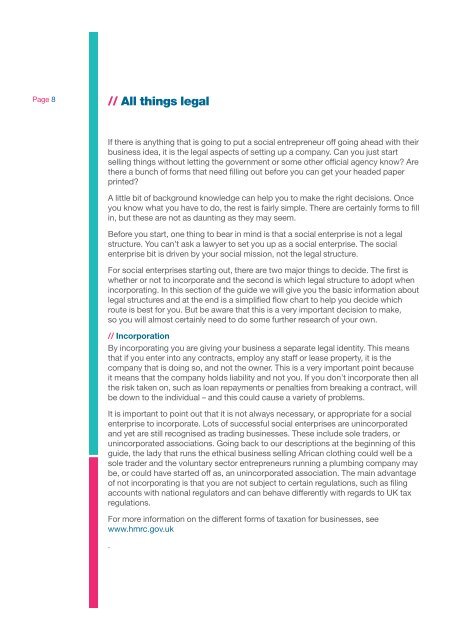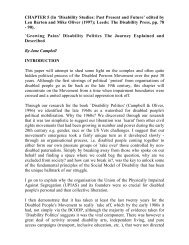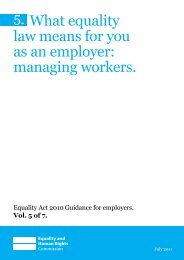The Social Enterprise Starting Point Guide
The Social Enterprise Starting Point Guide
The Social Enterprise Starting Point Guide
Create successful ePaper yourself
Turn your PDF publications into a flip-book with our unique Google optimized e-Paper software.
Page 8// All things legalIf there is anything that is going to put a social entrepreneur off going ahead with theirbusiness idea, it is the legal aspects of setting up a company. Can you just startselling things without letting the government or some other official agency know? Arethere a bunch of forms that need filling out before you can get your headed paperprinted?A little bit of background knowledge can help you to make the right decisions. Onceyou know what you have to do, the rest is fairly simple. <strong>The</strong>re are certainly forms to fillin, but these are not as daunting as they may seem.Before you start, one thing to bear in mind is that a social enterprise is not a legalstructure. You can’t ask a lawyer to set you up as a social enterprise. <strong>The</strong> socialenterprise bit is driven by your social mission, not the legal structure.For social enterprises starting out, there are two major things to decide. <strong>The</strong> first iswhether or not to incorporate and the second is which legal structure to adopt whenincorporating. In this section of the guide we will give you the basic information aboutlegal structures and at the end is a simplified flow chart to help you decide whichroute is best for you. But be aware that this is a very important decision to make,so you will almost certainly need to do some further research of your own.// IncorporationBy incorporating you are giving your business a separate legal identity. This meansthat if you enter into any contracts, employ any staff or lease property, it is thecompany that is doing so, and not the owner. This is a very important point becauseit means that the company holds liability and not you. If you don’t incorporate then allthe risk taken on, such as loan repayments or penalties from breaking a contract, willbe down to the individual – and this could cause a variety of problems.It is important to point out that it is not always necessary, or appropriate for a socialenterprise to incorporate. Lots of successful social enterprises are unincorporatedand yet are still recognised as trading businesses. <strong>The</strong>se include sole traders, orunincorporated associations. Going back to our descriptions at the beginning of thisguide, the lady that runs the ethical business selling African clothing could well be asole trader and the voluntary sector entrepreneurs running a plumbing company maybe, or could have started off as, an unincorporated association. <strong>The</strong> main advantageof not incorporating is that you are not subject to certain regulations, such as filingaccounts with national regulators and can behave differently with regards to UK taxregulations.For more information on the different forms of taxation for businesses, seewww.hmrc.gov.uk.














